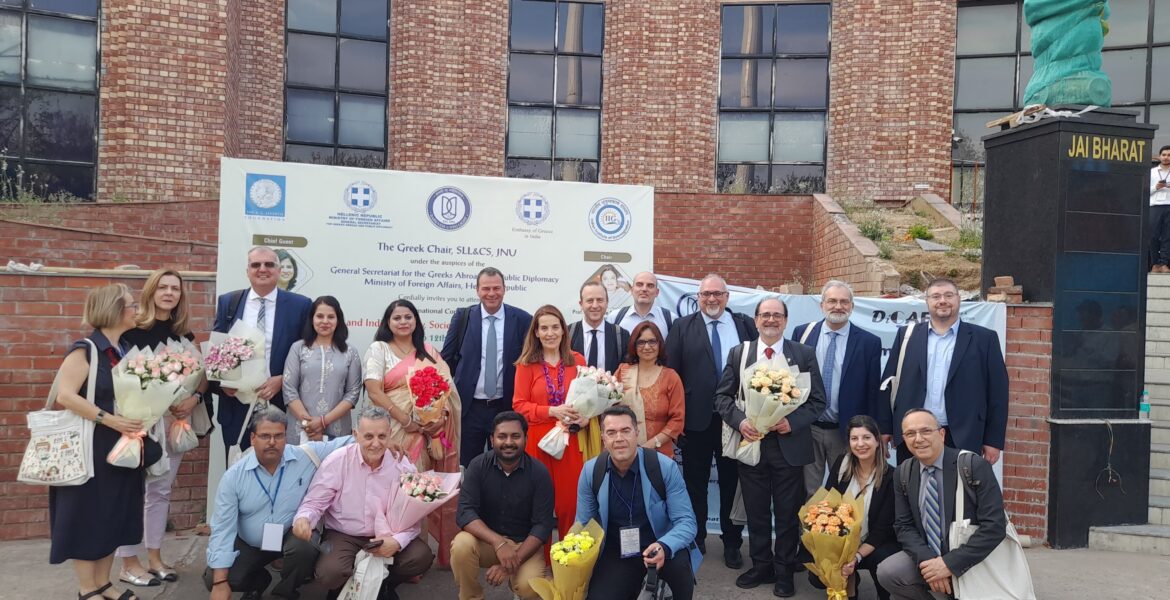The conference "Greece and India: History, Society, Science & and Entrepreneurship" was held from April 8 to 12 in New Delhi, under the auspices of the General Secretariat of Hellenism Abroad and Public Diplomacy, with the participation of the Embassy of Greece in New Delhi, and was a first-class occasion and opportunity for - among other things - the search for strategic synergies in matters of research and innovation and their connection with entrepreneurship between Greek and Indian universities.
The conference was the result of a collaboration between three of the largest Greek Universities (Aristotle University of Thessaloniki, National and Kapodistrian University of Athens, and International University of Greece) with the Indian Jawaharlal Nehru University (JNU) and the Chair of Greek Studies, which was under the direction of Anil Kumar Singh, a graduate of the University of Ioannina.
In the context of "Greece and India: History, Society, Science & and Entrepreneurship," which concluded with sessions in four scientific fields held alongside a business forum and over 50 announcements, meetings were held with the rectors of JNU, the Indian Institute of Technology, and Amity University. Prospects for cooperation and the development of common study programs were discussed.

Besides, with the assistance and supervision of the Greek Embassy in New Delhi, the field of contacts and collaborations of Greek HEIs with major Indian Universities (private or state) which expressed interest in cooperation and also in the creation of Chairs of Greek Studies was expanded, while they were also discussed the scholarship possibilities for students from India who are interested in studying in Greek Universities.
Greece-India relations through a wide range of scientific fields
The conference opened with greetings from the Minister of Foreign Affairs and Culture of the Indian government, Meenakshi Lekhi, the Secretary General of Hellenism Abroad and Public Diplomacy, John Chrysoulakis, the Secretary General of Higher Education, Odysseus Zora and the Ambassador of Greece to India Aliki Koutsomitopoulou.
The conference updated the historical reality of the centuries-old contacts between the Greek world and India by bringing together academics from a wide number of scientific fields (History, Culture, Tourism, International Relations, Diplomacy, Informatics, Technology, Innovation, Agriculture, Agrotechnology and Environment) as well as groups businessmen from the two countries, with the aim, not only to analyse aspects of historical communication but also to strengthen current collaborations or to detect further areas of synergy between the two peoples, in the fields of modern science and economy.
The Greek Universities were represented by academics-senior executives of their administrations (Professor Efstratios Stylianidis - AUTH Management Council, Professor Nikolaos Thomaidis - EKPA Management Council, Prof formation of Public Relations and Electronic Government DIPAE) and by professors who conduct innovative and pioneering research in the aforementioned scientific fields.
On the first day of the conference, the India-Middle East Corridor (IMEC) was given its due in the session dedicated to History, International Relations, and Geopolitics.
From the Indian side, the speech by the retired lieutenant general and deputy chief of the Indian Army (Lt. General) Philip Campose was particularly important as he coherently presented the reasons why Greece and India complement each other in the strategic maritime corridor communication between Europe and India.
Amb. Anil Trigunayat (former Ambassador of India to Jordan, Libya and Malta) and Amb. Amrit Lugun (former Ambassador of India to Greece) also pushed the same points.
The importance of the chair of Greek studies at JNU in promoting understanding and cooperation between the two peoples was also particularly emphasised.
The importance of Greece in India's contacts with the European Union was emphasised by Professor Ummu Salma Bava (Director of the Center for European Studies at the School of International Relations of JNU), while Professors Sheetal Sharma of Cultural Diplomacy and Kaushal Kumar Sharma (Dean of the School of Social sciences) approached Greek-Indian contacts in the light of their common Indo-European languages and traditions, their historical contacts and explored areas where modern forms of cooperation could be extended. From the Greek side, topics related to innovative research in Greek universities and their international study programs were presented.
During the second day of the conference, comparative studies of the ethnic diaspora of both Greece abroad and India were presented. There were presentations of the strategies and actions of the Secretariat of Hellenism Abroad and Public Diplomacy, as well as studies of the structure and organisation of the Greek diaspora in America and the two-way relations with the Greek state. Students and faculty of the European Studies Department of JNU University are particularly interested in the actions of the Secretariat of Hellenism Abroad and Public Diplomacy in their efforts to study and propose policies for the large Indian diaspora (over 80 million).
The 2nd “Greece and India: History, Society, Science & Entrepreneurship” will be held in Greece in December 2024.
The conference followed the centuries-old tradition of exchanges of views and ideas between the Greek and Indian worlds. Culture, arts, economics, religion, literature, commerce - almost everywhere Greek and Indian scientists exchanged evidence and reinterpreted views, ideas and concepts.
This is also why a second round of announcements and talks will be repeated in Greece in December 2024, with the four Universities collaborating again to realise the 2nd Conference, "Greece and India: History, Society, Science & Entrepreneurship."
The ultimate goal is to detect the challenges and opportunities in the 21st century, towards which Greece and India could propose a common approach in the context of a wider communication between Europe and India.
READ MORE: Will the 21st century be India's? – Relations with the world and Greece.


